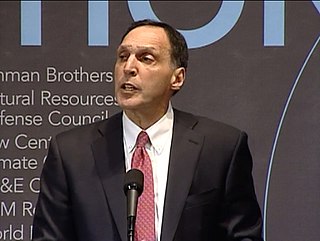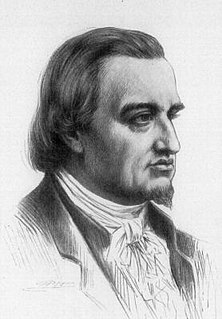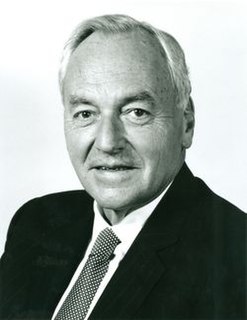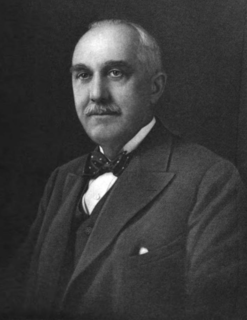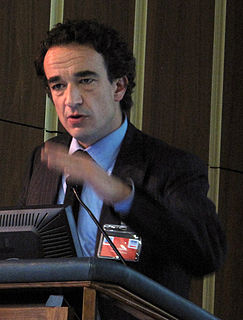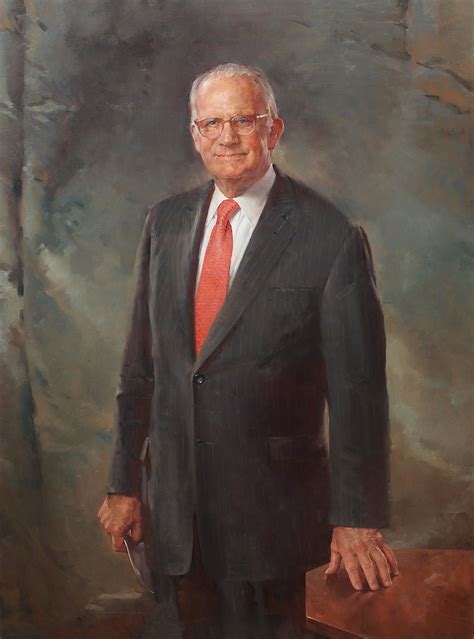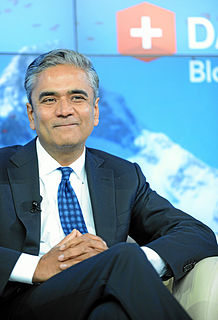Top 100 Quotes & Sayings by Famous Bankers
Explore popular quotes by famous bankers.
I was really interested in 20th century communalism and alternative communities, the boom of communes in the 60s and 70s. That led me back to the 19th century. I was shocked to find what I would describe as far more utopian ideas in the 19th century than in the 20th century. Not only were the ideas so extreme, but surprising people were adopting them.
There can be no freedom of the individual, no democracy, without the capital system, the profit system, the private enterprise system. These are, in the end, inseparable. Those who would destroy freedom have only first to destroy the hope of gain, the profit of enterprise and risk-taking, the hope of accumulating capital, the hope to save something for one's old age and for one's children. For a community of men without property, and without the hope of getting it by honest effort, is a community of slaves of a despotic State.
As mass production has to be accompanied by mass consumption, mass consumption, in turn, implies a distribution of wealth ... to provide men with buying power. ... Instead of achieving that kind of distribution, a giant suction pump had by 1929-30 drawn into a few hands an increasing portion of currently produced wealth. ... The other fellows could stay in the game only by borrowing. When their credit ran out, the game stopped.
The secular utopians basically said the exact same thing, they just took the Bible out of the equation. The religious and the secular groups recognized each other as fellow travellers. They exchanged newsletters and asked each other questions like, "What's a good soup pot to use if you're making dinner for 800 people?" They had these practical connections.
Those who are not capable of sinning are said that they have attained freedom. The knowledge of the Truth raises them even more. This makes them both free and above this world. But only Love creates. He who became free thanks to knowledge, because of Love remains a slave of those who have not managed to attain the Freedom of knowledge yet. He brings the knowledge to them and this develops the latter because it calls them to the Freedom. Love takes nothing: how can it take something? Everything belongs to it. It does not say, "This is mine! And this is mine!" But it says: "This is yours!"
The biggest names in the Transcendentalist literary circle visited the community regularly, and supported it, but they couldn't live there happily. Hawthorne [who was briefly a resident] left for reasons I'm sure make sense to you; he couldn't get enough writing done in a house full of people playing music, and arguing. It was too busy.
The thought was, 'We're going to go to California, where the soil is black and ten feet deep, and there are no rocks, and there's gold in the hills.' The West becomes the surface onto which people project their fantasies, where once the future had been the place they projected their fantasies. So it's not just the war that ends the utopian communities, but what follows.
I worry that I may have overstated the impact of Civil War on the utopians. By the time the Civil War comes, most of the communities were quite separated from the wider American society. Their rhetoric is still about transforming the world, but they're not having that much traffic with their neighbors.
The Jacksonian era is generally talked about in terms of individualism, and the development of free market capitalism, and Victorian prudery. It was shocking to find a parallel history to that - a bunch of Americans with very different priorities. I stumbled on to these people, and then became completely fixated on them. The question that drove me was: how did these reasonable people adopt these extremely unreasonable ideas?
If you want to conquer lust for wealth, love selflessness and sparing way of life. If you want to conquer anger, develop meekness and generosity. Grieve only if you have committed a sin, but even in this case do not grieve too much, otherwise you may become desperate. If you want to conquer conceit, do not desire praise, laurels, nice garments, respect, favor, but like to be blamed and slandered by people... If you want to conquer pride, do not say that your deed was done by your hands and might; say that with God's help and guidance it was done, not by my power and efforts.
Some important ideas from the book of early Christians which is called Philokalia: From Spiritual Directions of Diadochus of Photiki The acme of faith is... immersion of the mind in God. The acme of freedom from wealth is to desire to be possessionless even as others desire to possess. The acme of humbleness is to forget unfalteringly good deeds of oneself. The acme of love is to enhance your friendly attitude to those who insult and revile you.
They [Oneida people] didn't want to fix problems one at a time. If someone invited them to a feminist convention, their answer would have been, 'In the new world women will have total equality, so lets spend our energy creating that whole new world.' And to their credit, the women at Oneida probably had far greater practical equality than what any of the women gathered at Seneca Falls experienced in their lifetimes.
These weren't college kids on acid. They were preachers, and bankers, and farmers, and the salt of American society subscribing to ideas that now seem so wild to us. These people had the most radical visions of what the future could be. And this was happening in an era we don't typically associate with sexual experimentation, or communism, or things like that.
The religious and irreligious are agreeing with each other almost all the time. Their rhetoric is the same, and their plans are the same. Through slightly different interpretations, they all think the same thing is going to happen, that the Earth is going to be perfected and that humans are going to do the work of perfecting it.
Margaret Fuller was already a celebrity, travelling around the world. Emerson, who was the axis around which that whole community turned, just didn't like Fourier's ideas very much. He thought it was all too rigid and programmatic. He said, "Fourier had skipped no fact but one, namely life." He thought it was an inhumane system - the day is scheduled too precisely. He didn't think it would work, and he was right.
Because the utopian's worldview was framed around moving toward this perfected future, it helped stimulate the private exertions that add up to social progress. Progress is work. People need to build things and sacrifice and have a harder life for things to get better. On its own, I don't think even the most brilliant critique stimulates that kind of effort as well as an appealing vision of the future.
don't think I should be in the business of making big pronouncements about where we are now, but I would say that dissatisfaction is as acute now as it was then. What's different, and what I think we can learn from these people, despite their abundant folly, is that we're not using the future as the organizing principle for our critique.
So there's that change of general consciousness, and then there's this boom after the war, this expansion into the West. It was like the 1950s. The American economy was pumping at top speed. The kinds of people who would move into these communities and organize their lives around a utopian dream now had dreams about the West.
Utopians don't say, 'The world's corrupt, women make less money, people of color are oppressed at every turn.' You don't list the problems of the world; you describe a world in which those things aren't the case. The critique is implicit and as a result it's kind of a positive critique. You're not listing what's bad, but rather what would be good - you're oriented toward this positive vision.
The Oneida Perfectionists, along with some of the others, believed that feminism, and abolitionism, and other causes that they pursued in their own way without participating with other people outside of their communities, were all piecemeal reforms. That's what makes a utopian a utopian, this idea that they were going to create a whole new world from scratch.



